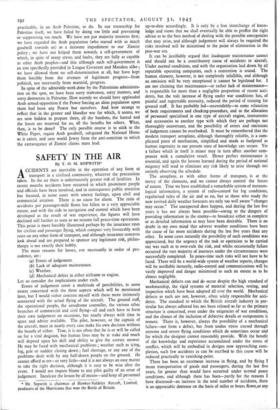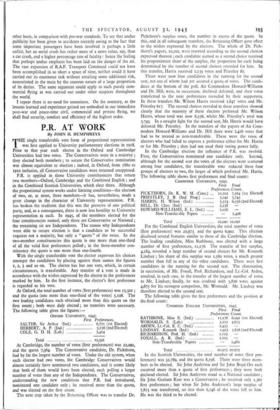SAFETY IN THE AIR
By T. 0. M. SOPWITH• The main reasons for losses, rot necessarily in order of pre- cedence, are : (a) Errors of judgement.
(b) Lack of adequate maintenance.
(c) Weather.
(d) Mechanical defect in either airframe or engine.
Let us consider the implications under each.
Errors of judgement cover a multitude of possibilities, to some extent concerned with the three aspects which will be mentioned later, but I would rather concern myself with those more intimately connected with the actual flying of the aircraft. The ground staff, the operational people, the aerodrome controller, the various other branches of commercial and civil flying—all and each have to form their own judgement on occasions, but nearly always with time to spare and advice available. The pilot, however, or the captain of the aircraft, must in nearly every case make his own decision without the benefit of either- True, it is not often that he is or will be called on for a vital decision, but human lives may be at stake and much will depend upon his skill and ability to give the correct answer. He may be faced with mechanical problems ; weather such as icing, fog, gale or sudden closing down ; fuel shortage, or any one of the problems dealt with by any half-dozen people on the ground. He cannot afford to err—or very little—and it is not always an easy matter to take the right decision, although it is easy to be wise after the event. I would not impute blame to any pilot guilty of an error of judgement. Inculcate the lesson by all means—and keep all personnel
* Mr. Sopwith is chairman of Hawker-Siddeley Aircraft, Limited, producers of the Hurricanes that won the Battle of Britain.
up-to-date accordingly. It is only by a free interchange of know- ledge and views that we shall eventually be able to proffer the right advice as to the best method of dealing with the possible emergencies that may arise, and although judgement will always be required the risks involved will be minimised to the point of elimination in the post-war era.
It can be justifiably argued that inadequate maintenance cannot and should not be a contributory cause of accidents to aircraft.
Under normal conditions, and with the organisation laid down by all reputable operating companies, such a contention is sound. The human element, however, is not completely infallible, and although an omission will be very exceptional it cannot be legislated for. I am not claiming that maintenance—or rather lack of maintenance— is responsible for more Than a negligible proportion of recent acci- dents, but the yak increase of flying under war conditions has, of painful and regrettable necessity, reduced the period of training for ground staff. It has probably led—unavoidably—to some relaxation of both requirements and checking-procedure, and to the allocation of personnel specialised in one type of aircraft engine, instruments and accessories to another type with which they are perhaps not thoroughly conversant, and the possibility of errors and omissions of judgement cannot be overlooked. It must be remembered that the modern transport aeroplane, although thoroughly reliable, is a com- plicated piece of mechanism, simplified. and made as foolproof as human ingenuity in our present state of knowledge can secure. Yet a failure which in itself is minor may in turn affect another com- ponent with a cumulative result. Hence perfect maintenance is essential, and again the lessons learned during the period of national exigency will tend to eliminate any risk likely to arise through not entirely observing the schedule.
The aeroplane, as with other forms of transport, is at the mercy of the elements, and we cannot always control the forces of nature. True we have established a remarkable system of meteoro- logical information, a system of radio-control for fog conditions, regularised rules of the air and so on, but as those who study the now revived daily weather forecasts are only too well aware " changes may occur." The unexpected does happen, and during the last five years it has not always been possible—owing to the dangers of providing information to the enemy—to broadcast either as complete or as detailed information as may have been desirable. There is no doubt in my own mind that adverse weather conditions have been the cause of far more accidents during the last five years than any other. In some cases naturally the possibility of such conditions was appreciated, but the urgency of the task or operation to be carried out was such as to over-rule the risk, and whilst occasionally failure occurred the vast majority of journeys under the circumstances were successfully completed- In peace-time such risks will not have to be faced. There will be a world-wide system of weather reports, changes will be notifiable instantly, radio-control and communications will be vastly improved and danger minimised to such an extent as to be almost negligible.
Mechanical defects can and do occur despite the high standard of workmanship, the rigid systems of material selection, testing, and inspection which have been adopted all over the world. Mechanical defects as such are not, however, often solely responsible for acci- dents. The standard to which the British aircraft industry in par- ticular has always adhered has not been relaxed so far as the primary structure is concerned, even under the exigencies of war conditions, and the chance of the inclusion of defective details or components is remote. There is, however, always the possibility of a mechanical failure—not from a defect, but from undue stress caused through extreme and severe flying conditions which do sometimes occur and for which the designer cannot reasonably provide. With the benefit of the knowledge and experience accumulated under the stress of conflict, which will be embodied in designs now approaching com- pletion, such few accidents as can be ascribed to this cause will be reduced practically to vanishing-point.
There has been an enormous increase in flying, and by flying I mean transportation of goods and passengers, during the last five years, far greater than would have occurred under normal peace conditions, and although there has been—partly for the reasons I have discussed—an increase in the total number of accidents, there is an appreciable decrease on the basis of miles or hours flown,or any other basis, in comparison with pre-war standards. To say that undue publicity has been given to accidents recently owing to the fact that some important passengers have been involved is perhaps a little unfair, but an aerial crash has rather more of a news value, say, than a car crash, and a higher percentage rate of fatality : hence the feeling that perhaps undue emphasis has been laid on the danger of the air. The vast expansion of R.A.F. Transport Command could not have been accomplished in so short a space of time, neither could it have carried out its enormous task without entailing some additional risk, necessitated in the main by the onerous nature of a large proportion of its duties. The same argument could apply to such purely com- mercial flying as was carried out under other auspices throughout the world.
I repeat there is no need for uneasiness. On the contrary, as the lessons learned and experience gained are embodied in our immediate post-war and peace-time civil, commercial and private flying, we shall find security, comfort and efficiency of the highest order.



























 Previous page
Previous page